Kissing Books: The problem with cruel
Every month, Olivia Waite pulls back the covers, revealing the very best in new, and classic, romance. We're extending a hand to you. Won't you take it? And if you're still not sated, there's always the archives.
April is the cruelest month, according to one of our crueler poets — so what better time to talk about cruelty in romance?
Cruelty, as a character trait or behavior, is largely the province of male main characters, especially in m/f romances. Heroes get to curl lips, issue scornful declarations, hold themselves aloof from the suffering of lesser beings; heroes have eyes like ice chips, and dungeons full of whips and shackles, and inflict punishing kisses upon their love interests.
Heroes can never really be too cruel: so long as you offer a compelling enough backstory (some woman betrayed him, his family abused him, his government ordered him to murder and torture) you can excuse almost any kind of cold-heartedness.
Heroines are allowed to be frosty, or wary, or lonely, and increasingly heroines are permitted to be angry (some delightful new examples are reviewed below) — but it’s common knowledge among romance authors that if you write a heroine as anything approaching cruel, even if it’s only a single line in a single scene, you are going to get a flood of reviews calling her an ungrateful bitch who doesn’t deserve true love.
The double standards really aren’t hard to uncover. We expect and excuse cruelty from men; we abhor it from all other genders.
Cruel heroes often bother me because so many times their cruelty is paired with vast amounts of political, social, financial, and/or magical power. Aristocrats, bikers, billionaires, SEALs, cops, alpha shifters or vampires or ancient dragon spieces older than humankind — romance will happily fetishize cruelty as long as it’s tied to power and a sick set of abs.
To give one typical concrete example, I once read a cop hero who used police databases to find the heroine’s number, and call her to talk dirty and badger her for a second date while she was at her job at a women’s rape/domestic violence clinic; she agreed because “he would probably just show up at her house anyway” and over the rest of the novel he proceeded to blow past her safewords, laugh at the idea that her body was her own, and take total control of her life.
The author referred to this as a “negotiation.” Reviews are largely positive.
On a panel at this most recent Emerald City Comic-Con, my fellow romance authors and myself talked about the Sexified Villain: characters who are antagonists in the story arc but who nevertheless become fan favorites, romanticized and swooned over. Nicholas Kole flipped the phrase manic pixie dream girl into depressive demon nightmare boy to describe this trope, and it really can be alarming how many people rush to excuse selfish behavior and even outright evil from such characters (Loki, Kylo Ren, and Draco Malfoy being prime examples — but also the Phantom of the Opera, Severus Snape, Christian Grey, and a few incarnations of Sherlock Holmes and Moriarty both).
Plenty of romance heroes fit this archetype: widowers in a Gothic manor, orphaned billionaires, outlaw gang leaders, etc. An old theory from Dangerous Men and Adventurous Women holds that romance arcs function to tame/civilize male power and bend it to the heroine’s benefit, which implies romance novels/sexified villain fandoms are treatments for the symptoms of patriarchy which avoid curing the disease itself. Which is a fancy way of saying that girls romanticize Draco to cope with the fact that Draco or someone like him has the power to hurt them.
But what if it’s a little weirder than that? What if young women and girls learn early on to recognize the lies that patriarchy tells? Girls aren’t really people, for instance, is a pretty easy lie to see through when you are in fact a girl and a person. So you start to assume that everything is lies, because you know that what you’re hearing from patriarchy isn’t credible. You rewrite the script in your head as a matter of course. This guy is bad is therefore something you’d be ready to resist or reject or find alternate explanations for, because you’re used to having to do that same kind of calculation for yourself and every other woman and non-dude person you know.
And since we’re talking media properties, odds are this character is being played by someone cis, thin, able-bodied, white, etc., which means they tick a lot of the same boxes necessary to be considered Officially Beautiful. You take a self-protectively revisionist mindset, a hot actor, et voilà! Sexy Draco!
I find myself performing a similar kind of mental acrobatics all the time — quite deliberately with the Other Woman whenever she appears in a romance (I’m something of a Caroline Bingley apologist), but also among my fellow readers and critics. If I see an author refer to a reader/reviewer as “mean” or “rude” or “snarky,” odds are I’m already halfway to believing the reader’s take on the book. This is not because all reviews are brave bastions of truth (for instance: Voldemort’s one-star review of the first Harry Potter book), but rather because I’ve grown used to seeing sharp, accurate critiques of individual works decried as “attacks” or “bullying” on social media — particularly when those critiques come from marginalized voices calling out racism, ableism and the like.
There is a pronounced culture of we should only say nice things in romance reviewing circles. Not coincidentally, there is also a type of White Lady who cares most vocally about politeness when it works to preserve her personal comfort and self-image. She has also grown up in patriarchy, and believes the lie that she is naturally nice, nurturing, and self-sacrificing. She believes other women are supposed to be those things, too, especially women with less social power — because those are the rules that put her almost at the top of the pyramid, just beneath White Men but above Black Men and Black Women and Queer Men/Women and so on. If you aren’t officially allowed to win, you’ll fight to stay in second place if it means not being last. And you’ll be incensed if anyone you think of as beneath you in the power structure decides the rules need to be thrown out altogether.
If you throw out the rules, second place has no value.
Of course this means that the Venn diagram of authors happy to fetishize male cruelty in fiction and authors who call critics and especially black and brown critics big ol’ meanies is essentially a circle. The playbook is stunningly predictable. You could set your watch by it, if your watch measured internet dumpster fires instead of time. And seeing it play out over and over has taught me that when I see anti-oppression analysis called out as mean — as cruel — it’s code for: This person dares to believe their words have power, when they should be yielding to mine.
Power is the ability to be cruel without consequences. Men who harm women get excused. White women who harm black people get excused. It would be enough to send a romance author/reviewer into a complete tailspin of despair — if it weren’t for all the other authors and reviewers and readers who see the same thing, both in and out of fiction, and are pushing back against it. For example, just off the top of my head:
- The Governess Affair and Mrs. Martin’s Incomparable Adventure by Courtney Milan
- A Duke by Default by Alyssa Cole
- A Lady Awakened by Cecilia Grant
- A Duke in Disguise by Cat Sebastian
- Any Old Diamonds by KJ Charles
All these books feature powerful, cruel men whose power must be broken or tempered in some way by the main characters. These books defend justice, and love, by fighting against cruelty. They use tenderness, honesty, warmth, consideration, blackmail, lies, thievery, arson, and murder — that last because as the author admits: “some villains need to die.” Mrs. Martin’s and A Duke In Disguise are reviewed below, along with books by Alyssa Cole, Rachael Stewart, and Rebekah Weatherspoon. Consider this month’s column not only cruelty-free, but cruelty-defeating.
Recent Romances:
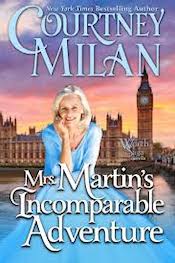
Mrs. Martin’s Incomparable Adventure by Courtney Milan (self-published: historical f/f):
Elderly lesbians take revenge for a lifetime of injury and insult while falling in love and literally burning everything down.
That’s it, that’s the review.
What more need be said? It’s exactly what you want based on that sentence, written in some of Courtney Milan’s best and funniest and most righteously infuriated prose. Violetta and Bertrice ought to be new patron saints of romance, with acolytes bringing offerings of chocolate and making cheesy toast over the pyres of contemptible men. And I know that sentence only makes sense if you’ve read the story — but the great generosity of this book is how it offers the reader a wealth of symbols, chants, and charms against terrible men. Against fear and invisibility and helplessness. In the week since finishing this I’ve taken to muttering “Robby Bobkins” under my breath when the terribleness is too much, and feeling my spirits rise again.
We need this book right now. Thank fuck we’ve got it.
One was impossible. One was contained. Alone, Mrs. Martin had felt cribbed in, made of complaints and unable to move. Two was a more dangerous number.
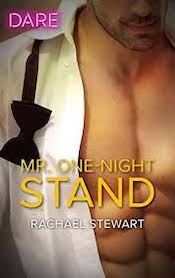
Mr. One-Night Stand by Rachael Stewart: (Harlequin Dare: contemporary m/f):
Harlequin’s new Dare line promises books that are “fun, edgy, and sexually explicit” and this juicy little drama nugget certainly delivers on that. This is a corporate-world “well that was some great casual sex — what do you mean we’re now business partners?” romance with high tones of old-school glam: skyscraper heels, perfect martinis, and a sophisticated heroine who knows precisely what she wants in bed. Jennifer is a sharp executive whose business acumen is never undermined by either the plot or the hero, and Marcus is just the right mix of cold corporatism and unrestrained lust. He is walled-off emotionally, but comes off more as stern than cruel. Their connection is electric and the best part of the story — heat and tension and magnetism that twists the emotional knife in a rich and satisfying way. Rarely has a forbidden romance been so plausibly, palpably irresistible.
Unfortunately some of the scene detail in this classic set-up hasn’t worn well. For instance, if I were a chauffeur, and my boss showed up with a disheveled, unconscious woman I’d never seen before and carried her into his bedroom, I’d hope I would have some pointed questions for him. (We know Jennifer was an enthusiastic participant, but the driver does not.) We’ve also got one of those No-Woman Beds I mentioned last month!
So yes, the book was enormous fun, but it also made my critical-historical brain start kicking up the dust of ideas. Dare is a line marketed as aggressively modern, so it begs the question: are the seeming-retro touches in this book part and parcel of that edginess? Regression presented as rebellion? It’s certainly a departure from the light rom-com tone many contemporaries are currently exploring — but if you look back to the pre-rom-com generation, the Jayne Ann Krentz/Judith Krantz years, Dare looks more like a continuity than a clean break. Like a notable nose, that happened to skip one generation of the family. Still, it’s nice to have options, so if you’re feeling like some of that Old Skool tone you’re in for a very good time.
His jacket lay across the arm of the chair, his forearm resting upon it. His other arm was folded, his hand curving over his inner thigh, his trouser-clad legs relaxed and spread. Open and vulnerable. The sight did things to her, things with a potency that almost scared her, and she flexed her fists into the bunched-up fabric of the sheets.
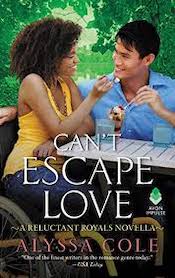
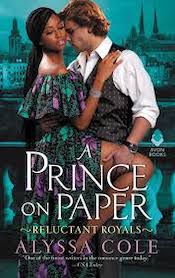
Can’t Escape Love (Avon Impulse: contemporary m/f) and A Prince on Paper (Avon Books: contemporary bi m/f) by Alyssa Cole:
At some point we are going to have to start referring to 2018–2019 as Alyssa Cole’s annus mirabilis. The entirety of the Reluctant Royals series thus far has appeared in that span, as well as two stunning entries in the Loyal League series. And a story in Bingo Love Vol. 1: Jackpot Edition.
It’s like when you learn that Dolly Parton wrote “Jolene” and “I Will Always Love You” in the same day. How the hell does she keep doing it?, mixed with profound gratitude that we are around to enjoy it.
The first book, Can’t Escape Love, is a novella-length Sleeping Beauty riff: heroine Reggie contracted meningitis in her youth and spent some time in a coma, and then more time coming to terms with the resulting physical and emotional fallout (ataxia, strained family relationships). Since then she’s built up a geek girl social media empire on the verge of becoming a powerhouse, and somewhat repaired her relationship with her twin sister Portia (of #swordbae fame). Gus is the puzzle-solver whose YouTube channel is the only thing that helps her sleep — and who is currently designing a high-profile escape room based on her favorite anime. Which is also a Sleeping Beauty riff. Everything in this novella is so richly layered and thoughtful that it feels like a complete world of its own. There’s not a wasted word in here.
Wealth is often packaged as a fantasy in romance: we’re treated to long descriptions of the hero’s penthouse, or manor, or beachfront getaway. Here it’s Reggie’s home that gets the lush descriptions, but the fantasy is accessibility: an environment that treats the disabled heroine’s physical needs as a matter of course, and is designed to answer them. Wealth certainly makes this fantasy possible — multiple custom wheelchairs are expensive — but there is a significant moral and psychological difference between money-as-escape and using-money-to-escape.
The novella fills in some of the between-the-lines from A Duke by Default: the full-length A Prince on Paper moves events further forward. Took me half the book before I realized what fairy tale we were dealing with, and then I damn near cheered, so you’ll forgive me for keeping it a smug secret so you can enjoy the reveal.
Our heroine is Nya, Prince Thabiso’s cousin, still reeling from the uncovering of her father’s betrayal and villainy in the first book in the series. (Um, spoilers!) Within five minutes I was muttering oh no to myself and wrapping my arms around my stomach to try and hold myself together — one of the great perils of reading romance is that sometimes you look into a book and the heroine stares back into your soul like you’re looking into a secret, agonizing mirror. Nya is lonely and self-conscious, both soft-spoken and sharp-tongued — and always, painfully aware of her own inconsistency. Even trying to write about this feels like I’m splashing my own issues all over this review in a manner that verges on oversharing. I would die for her, we say when we find the heroines who really reflect us — but it’s more than that. I’m dying with her, every time I turn another page.
Nya is glorious, and Johan deserves her.
This book has taken a place on my list of all-time favorites, alongside Jeannie Lin’s The Jade Temptress and Julie Garwood’s The Bride. Do not miss.
His head was dropped down, a mass of wild auburn, but it jerked up as the wooden door creakily announced her entry. She was met with ruddy cheeks and a sharp gaze that resonated within her private hollowness, like the sad moan of wind over the mouths of empty glass bottles.
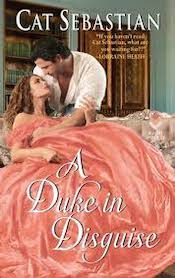
A Duke in Disguise by Cat Sebastian (Avon Impulse: historical m/bi f):
Finally, a romance highlighting Britain’s class conflict and paranoid fear of revolution in the post-Waterloo years!
That’s not a joke: I’m writing a seditious printer/engraver heroine myself currently, and am thrilled that Cat Sebastian has already brought us a seditious printer heroine to help establish that publishing in the early nineteenth century was often a radical, risky, at-odds-with-the-government-and-the-police kind of enterprise. So definitely part of my pleasure with this one was nerding out hard over names like Hone, Cobbett, Wollestonecraft, and Lord Sidmouth (that jerk).
Usually in duke-centric historicals we look at the class structure from the top down; here we start at the bottom, with heroine Verity Plum worried about actually having enough food to put on the table even before her firebrand brother Nate thoughtlessly invites three of his friends home for dinner. Hero Ash is an engraver (and epileptic) who rents a room with the Plums; he always smells of copper and rosin, the way Verity’s hands are always stained with ink, because when our characters aren’t working they’re worried about working (or cleaning up the workroom after the redcoats toss the shop on a trumped-up search warrant) in ways that will feel painfully familiar to any modern-day freelancer. It’s not all anxiety, however: Verity’s new ladies’ magazine/advice column and a filthy book about famous royal fraudster Perkin Warbeck keep things fun and witty in the best Cat Sebastian style.
The revelation that Ash is actually a duke’s long-lost heir crashes into this comfortable pattern like a cannonball, leaving smoking rubble and shrapnel in its wake. Descriptors of wealth and privilege that would feel matter-of-course in another romance novel here strike the reader as ridiculous, unnecessary, ill-gotten luxury (the value of a long setup cannot be overstated). Ash knows Verity would barely consider marrying him as a tradesman — she’d laugh in his face and call for a guillotine if he proposes as a future duke. Their whole relationship is prickly, argumentative, couched in inside jokes and half-truths and feigned indifference that fools absolutely no-one — and it’s hot enough to burn your fingertips as you speed through the pages.
This is a book about privilege versus principle, and surviving human malevolence, and resisting political tyranny, and I am so very, very happy it exists. Because “there might not be a difference between hope and stubbornness” is a sentence I very much needed to read, and suspect others will too.
Both men tilted their heads and regarded her. “Just out of curiosity, how often would you advise women with errant husbands to have their spouses abducted by pirates?” Nate asked.
“I’d have to look into the costs. Right now it occurs to me that one might arrange one’s obnoxious brother to be taken away. Might be worth a few pounds, especially if you keep bringing strangers to eat my mutton chops.”
This Week’s Polar Opposite of the Cruel Hero Trope
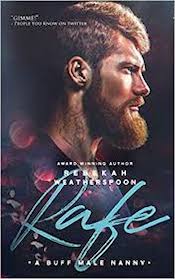
Rafe: A Buff Male Nanny by Rebekah Weatherspoon (self-published: contemporary m/f):
I’ve been saving this gem for a time when I really needed an uplift, and after the past few weeks in Romancelandia, I’m enormously glad I had something to escape into. Rafe is the absolute opposite of the stereotypical alpha hero: nurturing, considerate, sweet. Adorably wonderful with kids. Still has the sick abs, though, but since sick abs are not a moral flaw nobody’s inclined to complain.
Certainly not cardiac surgeon Sloan, whose six-year-old twins are more than a handful and whose live-in nanny up and quit without notice. Rafe is an emergency call and comes highly recommended by trusted friends. His enormous, muscular, tattooed, bearded biker body is the most tempting thing she’s seen in years — but her children come first, so she’s going to button up all her lust and keep things pleasant and professional and tidy, and everything will be just fine.
Reader, I cackled. We all know how this is gonna go.
There are romances that aim for a lyrical tone, historical texture, champagne fizz and froth. Weatherspoon’s vampire romances are glazed with a bit of pulp glitz, but the voice of this contemporary is best described as a direct motherfucker. Like Rafe himself, Rafe tells you upfront what you’re promised (a buff male nanny) and then just … goes and does it. No hesitation. Childcare, emotional support, cooking, cleaning, and some A-plus dicking — not out of any urge to control or posses, but simply because he cares. It’s pure, golden, every-level-of-fulfillment fantasy on a platter and it’s like water in the desert for Sloan, who spent her youth being a med-school prodigy and then married to a true contender for Asshole of the Universe. She deserves this. She needs this. And this reader loved watching her get it.
Nothing in the world is so good as a book that takes a flimsy, one-liner premise and then treats it with such care and attention that it blossoms into something that feels like a gift.
Sloan wished she didn’t have a visceral reaction to her ex-husband, but any time she was near him she felt like a trapped and wounded animal. She’d chew her own leg off to get away from him. He was handsome as hell and dressed his ass off, but god he sucked.